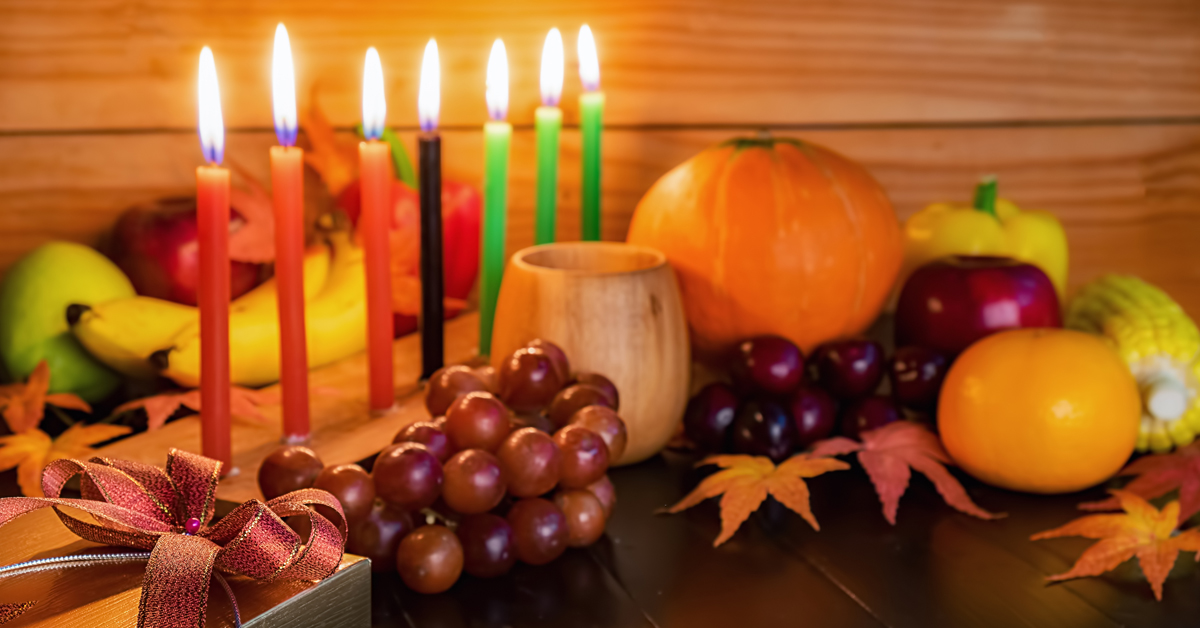
By Iris Jasmin
When I think about Kwanzaa, many memories come to mind. I remember vividly my daughter, when she was maybe in preschool or kindergarten, participating in a community Kwanzaa program with the children’s church choir. Her head covered with tons of long skinny plaits that had colorful beads on the ends of each one. Wearing her white turtleneck top and green skirt, she held a sign that displayed the Swahili word, Ujima, that is one of the seven principles of Kwanzaa.
One year, my father wanted to celebrate Kwanzaa with family and friends. We came together each evening of Kwanzaa that year to reflect and celebrate. It was a moving experience for me.
Most people saw my father, the late Judge Ernest Jasmin, as an intimidating figure in and out of the courtroom because of his booming voice and way with words. At times, I was intimidated as well. That week of Kwanzaa, I saw a side of my father I had never seen before.
My father began to reflect on one of the Kwanzaa principles as he reflected on his journey to success and how it made him feel to have all his children present. He got choked up with emotion. I had never seen my father shed tears before and seeing him get emotional caused me to tear up as well.
These are my only memories of celebrating Kwanzaa in a formal fashion, but this does not mean that I do not see Kwanzaa as being significant. Granted, the seven principles of Kwanzaa in Swahili — Umoja, Kujichagulia, Ujima, Ujamaa, Nia, Kuumba and Imani — are not words that easily roll off my lips.
When my father died, I held onto his Kinara (candle holder) and Umoja (unity cup) that we had used years ago for our Kwanzaa celebration. I keep both out all year long. Seeing the Kinara and Umoja on display remind me of how the principles and spirit of Kwanzaa have been instilled in me through family and community.
My maternal grandmother taught me Umoja, or unity, by her loving, compassionate spirit. Despite being homebound for years, she would reach out to others with letters and cards to let people know they were in her thoughts and prayers. My concern for and ability to connect with others comes from her.
My father’s example through his work ethic and wisdom shared laid my foundation for Kujichagulia, or self-determination. Because of him, I knew about many of the contributions and struggles of my people. It allowed me to see not only our diversity in ability and talent, but also our determination to achieve. I may have struggled to find my footing in my younger years, but it is because of what my father poured into my spirit that I was able to find my voice to speak my mind and determine my way.
The acts of kindness that I experienced or witnessed planted the seeds of Ujima, or collective work and responsibility, within me. Such as our neighbor across the street from my childhood home in the Chickasaw neighborhood who would display a huge smiley face up on her garage door. This was her way of announcing to the neighborhood that we were welcome to come over and swim in her pool. Her gesture brought us an opportunity to come together and cool off from the summer heat. I think of my times volunteering for Clothe-A-Child, which was a non-profit started by the late Eleanor Hutchison to assist economically disadvantaged children with their clothing needs. My time volunteering for her organization helped me understand our connectedness, so I understood that their struggle is mine as well.
Growing up in the church set the tone for my understanding of Nia, or purpose. I was taught that we all have a calling over our life, a purpose for our presence. Purpose is not just about what I should be doing for myself, but what I should be doing to be a blessing to others.
These are a few examples of how I have experienced the various principles of Kwanzaa developing in my life. As I see it, Kwanzaa is about unity, self-determination, working together, purpose, creativity and faith with regards to family and the community of the African diaspora. Kwanzaa is purposely coming together to reflect on how the seven principles have been lived out through the year and remember those who came before us to show us the way. When I get together with my friends throughout the year, we have conversations that are reflective of the beauty and power that I experienced years ago when I celebrated Kwanzaa at my father’s house.
Kwanzaa is about understanding our connectedness to our past and in our present and learning how to live in harmony with one another.
 Iris Jasmin is a native Louisvillian. She has worked as a health insurance professional for nearly three decades. She is a graduate of Florida A&M University and Louisville Presbyterian Theological Seminary and is currently pursuing her PhD in education and social change at Bellarmine University.
Iris Jasmin is a native Louisvillian. She has worked as a health insurance professional for nearly three decades. She is a graduate of Florida A&M University and Louisville Presbyterian Theological Seminary and is currently pursuing her PhD in education and social change at Bellarmine University.
The piece was originally published in the Courier-Journal and is reprinted here with permission.